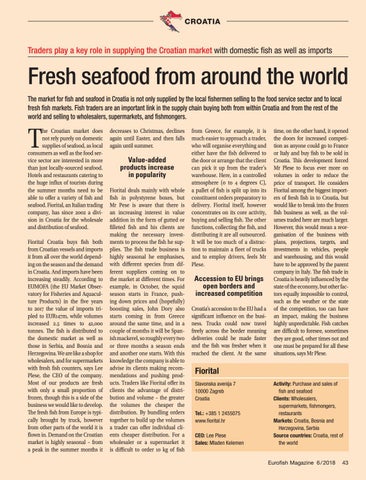CROATIA
Traders play a key role in supplying the Croatian market with domestic ďŹ sh as well as imports
Fresh seafood from around the world The market for ďŹ sh and seafood in Croatia is not only supplied by the local ďŹ shermen selling to the food service sector and to local fresh ďŹ sh markets. Fish traders are an important link in the supply chain buying both from within Croatia and from the rest of the world and selling to wholesalers, supermarkets, and ďŹ shmongers.
T
he Croatian market does not rely purely on domestic supplies of seafood, as local consumers as well as the food service sector are interested in more than just locally-sourced seafood. Hotels and restaurants catering to the huge influx of tourists during the summer months need to be able to offer a variety of fish and seafood. Fiorital, an Italian trading company, has since 2002 a division in Croatia for the wholesale and distribution of seafood. Fiorital Croatia buys fish both from Croatian vessels and imports it from all over the world depending on the season and the demand in Croatia. And imports have been increasing steadily. According to EUMOFA (the EU Market Observatory for Fisheries and Aquaculture Products) in the five years to 2017 the value of imports tripled to EUR147m, while volumes increased 2.5 times to 42,000 tonnes. The fish is distributed to the domestic market as well as those in Serbia, and Bosnia and Herzegovina. We are like a shop for wholesalers, and for supermarkets with fresh fish counters, says Lee Plese, the CEO of the company. Most of our products are fresh with only a small proportion of frozen, though this is a side of the business we would like to develop. The fresh fish from Europe is typically brought by truck, however from other parts of the world it is flown in. Demand on the Croatian market is highly seasonal – from a peak in the summer months it
decreases to Christmas, declines again until Easter, and then falls again until summer.
Value-added products increase in popularity Fiorital deals mainly with whole fish in polystyrene boxes, but Mr Pese is aware that there is an increasing interest in value addition in the form of gutted or filleted fish and his clients are making the necessary investments to process the fish he supplies. The fish trade business is highly seasonal he emphasises, with different species from different suppliers coming on to the market at different times. For example, in October, the squid season starts in France, pushing down prices and (hopefully) boosting sales, John Dory also starts coming in from Greece around the same time, and in a couple of months it will be Spanish mackerel, so roughly every two or three months a season ends and another one starts. With this knowledge the company is able to advise its clients making recommendations and pushing products. Traders like Fiorital offer its clients the advantage of distribution and volume – the greater the volumes the cheaper the distribution. By bundling orders together to build up the volumes a trader can offer individual clients cheaper distribution. For a wholesaler or a supermarket it is difficult to order 10 kg of fish
from Greece, for example, it is much easier to approach a trader, who will organise everything and either have the fish delivered to the door or arrange that the client can pick it up from the trader’s warehouse. Here, in a controlled atmosphere (0 to 4 degrees C), a pallet of fish is split up into its constituent orders preparatory to delivery. Fiorital itself, however concentrates on its core activity, buying and selling fish. The other functions, collecting the fish, and distributing it are all outsourced. It will be too much of a distraction to maintain a fleet of trucks and to employ drivers, feels Mr Plese.
Accession to EU brings open borders and increased competition Croatia’s accession to the EU had a significant influence on the business. Trucks could now travel freely across the border meaning deliveries could be made faster and the fish was fresher when it reached the client. At the same
time, on the other hand, it opened the doors for increased competition as anyone could go to France or Italy and buy fish to be sold in Croatia. This development forced Mr Plese to focus ever more on volumes in order to reduce the price of transport. He considers Fiorital among the biggest importers of fresh fish in to Croatia, but would like to break into the frozen fish business as well, as the volumes traded here are much larger. However, this would mean a reorganisation of the business with plans, projections, targets, and investments in vehicles, people and warehousing, and this would have to be approved by the parent company in Italy. The fish trade in Croatia is heavily influenced by the state of the economy, but other factors equally impossible to control, such as the weather or the state of the competition, too can have an impact, making the business highly unpredictable. Fish catches are difficult to foresee, sometimes they are good, other times not and one must be prepared for all these situations, says Mr Plese.
Fiorital Slavonska avenija 7 10000 Zagreb Croatia Tel.: +385 1 2455075 www.ďŹ orital.hr CEO: Lee Plese Sales: Mladen Kelemen
Activity: Purchase and sales of ďŹ sh and seafood Clients: Wholesalers, supermarkets, ďŹ shmongers, restaurants Markets: Croatia, Bosnia and Herzegovina, Serbia Source countries: Croatia, rest of the world
Eurofish Magazine 6 / 2018
$ ! )+&&
43
